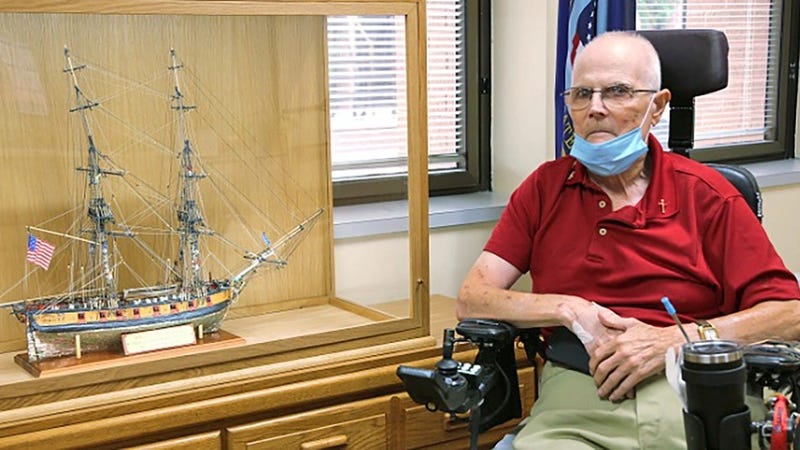
One of the first things visitors to the Spinal Cord Injury and Disorder clinic at the Audie L. Murphy Memorial Veterans Affairs Medical Center see is a wooden replica of the U.S.S. Syren.
It took Army veteran John Bemben over two years to build the replica plus a few more to get it into the SCI/D lobby, in San Antonio Texas, according to a VA release.
“I was trying to do this for five years and hoping that just one person sees it,” he said.
Bemben has been a patient at South Texas VA and the SCI/D clinic for 20 years and his history with modeling is almost as long and storied as the ship itself.
He has been modeling for 50 years and has finished six models in the last 15 years. In addition to a broken neck, Bemben also suffers from Multiple Sclerosis, which he says saps a bit of his energy.
“It doesn’t interfere with my modeling,” Bemben said. “When I get tired, I just know it is time for me to step away from it.”
There are several other completed kits on display at SCI/D. They are just one of the activities the facility's expanded recreation therapy program offers patients.
“Veterans who recreate can look forward to reducing depression, stress and anxiety, in addition to improving basic motor functioning and fine motor skills when participating in meaningful activities and hobbies, such as model building, painting, etc.,” said Erin Dixon, chief of Recreation Therapy Service.
“Modeling helps with everything. It helps my hands, my motor skills and makes me think about what I’m doing,” Bemben explained.
Maintaining cognitive abilities is what keeps Bemben moving forward. He admits he wasn’t always so positive when he first became quadriplegic.
“Sixteen years went by and all I was doing was watching old movies, and I needed something better to do, so I built ships,” he said. “You have to have a reason to live.”
A research study conducted by the Mayo Clinic found participants who engaged in artistic hobbies such as painting, drawing or sculpture in both middle and old age were 73 percent less likely to develop mild cognitive impairment than those who didn’t. Those who crafted—doing things like pottery, woodworking, quilting or sewing—were 45 percent less likely to develop mild cognitive impairment.
Bemben also spends time mentoring other SCI/D patients. As an inside joke between patient and provider, mentoring is part of Bemben’s official duties as “associate of patient care.” He takes this charge seriously.
“If I can help anybody, help them in the chair, you got it,” he said.
One thing that Bemben’s physician and Chief of SCI/D Dr. Divya Singhal hears is that, when it comes from a veteran who is in a similar situation, peer support is invaluable. Singhal tapped into the power of that peer support and asked Bemben to mentor a few newer spinal cord patients who were having difficulties transitioning. Singhal also responded to Bemben’s original request to bring a model into the hospital.
“I understood where he was. I feel like I made a difference. When the person telling you what to expect has been there, it’s different than hearing it from a doctor,” Bemben said.
Reach Julia LeDoux at Julia@connectingvets.com.



